- Home
- David Bernstein
Surrogate
Surrogate Read online
Table of Contents
SURROGATE
Connect With Us
Other Books by Author
1
2
3
4
5
6
7
8
9
10
11
12
13
14
15
16
17
18
19
20
21
22
23
24
25
26
27
28
29
30
31
32
33
About the Author
About the Publisher
SURROGATE
David Bernstein
First Edition
Surrogate © 2014 by David Bernstein
All Rights Reserved.
A DarkFuse Release
www.darkfuse.com
This book is a work of fiction. Names, characters, places and incidents are either a product of the author’s imagination or are used fictitiously. Any resemblance to actual events, locales or persons, living or dead, is entirely coincidental.
Connect With Us
Find out why DarkFuse is the premier publisher of dark fiction.
Join our newsletter and get free eBooks:
http://eepurl.com/jOH5
Follow us on Twitter:
http://twitter.com/darkfuse
Like us on Facebook:
http://www.facebook.com/darkfuse/
++++====++++
Join the DarkFuse Readers Book Club:
http://www.darkfuse.com/book_club/
++++====++++
Other Books by Author
Relic of Death
Check out the author’s official page at DarkFuse for a complete list:
http://www.darkfuseshop.com/David-Bernstein/
For my Dad
Acknowledgements
I’ve been reading Delirium and DarkFuse titles for years, and it’s great to be aboard. I’d like to thank Dave Thomas for the incredible job he’s done with this tale—simply amazing. My experience working with the DarkFuse team has been nothing short of superb, and it couldn’t have gone smoother. I’d also like to thank Sandy, who has been traveling with me on this writing journey since the beginning. The work you do, the proofreading, editing, is priceless.
1
Rebecca Hardwick was standing in her garden, gathering fresh vegetables for tonight’s dinner, when she heard the gunshot. A second later, something slammed into her gut. The air was squeezed from her lungs. She was thrown backward in a twisting fashion, like an out-of-control top. She crashed to the ground, landing hard onto a patch of cucumbers, the vegetables bursting beneath her.
Her brain hadn’t registered anything yet, not putting two and two together. The sound of a firearm going off was not uncommon for the area. Residents were always shooting at targets, cans or bottles, and during hunting season, of which it was, gunshots were as normal-sounding as kids playing in the yard.
Breathing was difficult, but possible. She craned her neck around to get a look at what had hit her, expecting to see a bull or linebacker, but there was no one. She glanced at her stomach and saw that her white blouse now had a red flower on it, the petals blooming before her eyes. Her mind raced for answers, but for some reason, she could not come up with one.
Then the hurt arrived, racking her core with a searing heat, as if she’d been stabbed with a red-hot fireplace poker. The pain was overpowering, spreading throughout her body, shooting down her limbs and up into her brain. Her ears were ringing. She closed her eyes and saw white flashes of light, and knew something really bad had happened.
Her mind worked furiously—the gunshot, the immense pressure, the pain, the blood… It worked all these things out, and then she knew.
Rebecca attempted to crawl, but the pain was too much. Then she went numb, closed her eyes and fell unconscious.
2
“Where’s my wife?” Tom asked the nurse who was sitting behind the emergency room’s reception window. Sweat lined his body, his white button-down shirt plastered to his skin. His tie was loosened and he appeared haggard, like a coked-out Wall Street tradesman. He was a desperate, frightened man, his eyes like so many others that had come to this place needing answers.
His neighbor, Mrs. Norris, hadn’t told him much over the phone, just that Rebecca had been shot and there was a lot of blood, and that she had been taken to Saint Luke’s Hospital.
Tom needed to see his wife, to know she would be okay. The longer he had to wait, the more his mind twisted and turned with possibilities. She could die, or already be dead. Maybe she would be on life support, and in a month or so he would have to make the terrible decision to pull the plug.
“What’s your wife’s name, sir?” the nurse asked.
Behind the woman, Tom saw part of the hospital’s inner workings. Nurses, doctors and aides milled about. Some were hurrying, others not. Phones rang and keyboards clicked. The woman sitting in front of him was plump, but pretty, with kind eyes.
Tom’s mind processed her question, but he was having a difficult time sorting out the simple answer. He kept thinking about what Mrs. Norris had told him. How his wife was unconscious and bleeding. There had been a lot of blood. He’d been on autopilot since hearing the news, leaving work immediately, and telling no one what had happened or where he was going.
“Rebecca,” he finally managed to say.
“Last name?” the nurse asked.
“Har…Hardwick. Her name is Rebecca Hardwick.” Tom leaned forward, resting his forearm against the partitioning glass. A small ghostly cloud formed where his hot breath hit the window.
“Let me check,” the woman said, her chubby fingers rapidly connecting with the keyboard.
Still eying the computer screen, she said, “She’s in surgery at the moment.”
Tom pushed away from the window, rubbing a clammy hand through his thick hair.
“Is she going to be okay?” he asked, still on autopilot. The question was a natural one, but one he knew the woman wouldn’t be able to answer. Still, he had to ask.
“Let me find someone who can better assist you.”
“Thank you.”
“Please, sir,” she said warmly, gesturing with her arm. “Take a seat in the waiting area. Someone will call you shortly.”
Tom nodded and turned around. The room was swamped with people sitting in chairs or leaning on walls. Every seat appeared to be occupied. A television sat high up on a shelf above a vending machine. He couldn’t hear the volume over the abundant amount of noise coming from the place.
He saw old people, wrinkled and marked with worry—forgotten relics, waiting for the inevitable news of death. Children sat with their parents, mommies rubbing their backs, or telling them to sit still. The good children, the ones behaving, played handheld video games.
Tom turned back to the nurse. “There are no seats.”
The woman paused a moment, then pointed past him. “There,” she said. “Someone just got up. Take a seat and I promise someone will be out shortly to talk to you.”
Tom turned around. He saw the unoccupied chair and walked zombielike toward it, then sat down. He felt eyes crawling over his body, as if he were the star of the show. Did most people look at the newly arrived and wonder what they were in for? If it was worse than their own situation?
He felt alone, like a soldier on a battlefield of the dead.
Closing his eyes, Tom’s thoughts prioritized themselves. His head was clearing, making room for responsibilities. He was the husba
nd, after all. The question of who to call first entered his mind. Her parents or his? Or should he wait to see what happened with her? Whether she…lived. Informing her parents of the situation would only cause worry and send them into a needless panic. It wasn’t like they could say good-bye; she was in surgery.
Tom’s mind raced, the thought of the surgeon coming out to tell him we did all we could was too much. He glanced around the room, focusing on different people as they spoke to each other or into cell phones. It seemed impossible to focus on an individual. Lips moved. Words were let loose into the air, creating a chaotic buzz around the room that amounted to nothing intelligible. Fingers moved in a blur as people texted on their phones and tablets, the action so damn natural. He wondered what their conversations were about. The younger people, the kids, were clearly more at ease than the adults. The former filled with innocence, a treasured commodity to have during a time of crisis. Let the adults do the worrying.
He tried focusing in on conversations. When that didn’t work, he attempted to read lips, but was unsuccessful.
Riddled with indecision, Tom decided to join the room’s occupants. He was going to call his parents and tell them what had happened. He pulled his cell phone out, ready to dial, when he heard someone call his name.
Tom looked up and saw a nurse standing near a door next to the reception window. She was holding a clipboard.
“Mr. Tom Hardwick,” she called, surveying the room.
He stood quickly, shoving his phone back into his pocket. “Here. I’m here,” he responded, waving his arm as he hurried toward the woman.
“Come this way, sir,” she told him, then turned away and headed through the doorway.
Tom was led into a small office and told to have a seat. The woman needed to know his wife’s medical history.
“Please,” he begged, “how is my wife?”
“She was struck by a bullet and lost a lot of blood, and she’s still in surgery. That’s all I know, Mr. Hardwick. Now, I need to get as much medical information about your wife as possible. It will aid the surgeons in helping Rebecca…possibly save her life.”
Tom nodded and answered the woman’s questions. Rebecca was relatively healthy and had been her whole life. She had never had any major surgeries; just tonsils removed and a broken finger that was set with a small titanium plate. And as far as his wife being allergic to anything, as far as he knew, she wasn’t.
“That’s about it, Mr. Hardwick,” the nurse said when she was finished. “From what it seems, your wife is a strong individual; a fighter.”
A thought suddenly struck Tom and he wondered how he could have forgotten such a thing.
“My wife and I were trying to have a baby,” he said.
The nurse looked up at him, and Tom saw a forced smile spread across her face.
“That’s wonderful,” she said.
“But,” Tom continued, “we haven’t been having much luck; she’s always busy with her career. She’s an architect.”
“I see…”
“Finally, recently in fact, we realized it was time. You know, to really try. She’s thirty-six and the chances of having a baby, let alone a healthy baby, decrease the older a woman gets. And we’re already candidates for not being able to get pregnant.”
“Is your wife taking any fertility drugs?”
As if stricken by a slap upside his head, Tom said, “On my God, yes. I should’ve remembered that.”
“It’s okay, Mr. Hardwick,” the nurse said, her tone light. “Don’t worry, that shouldn’t have any impact on your wife’s surgery.”
Tom found that talking with someone, anyone, especially a person in the medical field, had helped his state of mind.
After a minute of silence, save for the woman’s tapping on the keyboard, Tom’s emotional state was heading into the “panic” direction again. Without a continuous conversation, his mind was wandering back to horrific scenarios where it would most likely remain until he found out how his wife was really doing.
Tom’s head began to pound in rhythm with the nurse’s typing. Each stab of a key sent a sledgehammer-like jolt into his skull. He wanted to cry out and cover his ears; tell the woman, for the love of God, to stop typing. But he couldn’t move, feeling that the slightest movement on his part, even a breath, would result in the death of his wife. So he remained motionless.
The nurse looked up.
“Mr. Hardwick?” she asked. “Are you okay?”
Her voice, filled with tenderness and concern, broke through to him. He needed to hear such sweetness, such unsung melody. The feeling of utter hopelessness left him, like a weight lifted, as his insides began to crumble. Tears welled up in his eyes, his vision blurring and melting the world before him. Then he remembered to breathe, and when he did, burst into hysterics.
3
“Your wife is lucky to be alive, Mr. Hardwick,” the surgeon said.
It had been four hours since talking to the nurse when his wife’s surgeon finally came to speak with him. During that time he’d had only one update: that Rebecca was still in surgery.
Tom had dialed his and his wife’s parents’ phone numbers numerous times, only to hang up before the call went through. He couldn’t deal with all the questions they would ask. He didn’t need that; he needed support. More worrying heads wouldn’t help anyone. He fought with himself constantly whether or not to call, but decided to wait for an outcome, whatever it may be. They might be angry with him, especially her parents, but he needed to do what was right for him now.
“Mr. Hardwick?” the surgeon asked.
Tom shook his head. “Yes?”
“I was saying how lucky your wife is to be alive.”
“Yes…” Finally the doctor’s words sunk in. Relief flooded through him. But looking at the man’s face, he knew there’d be more. There was always more. His legs felt weak, so he sat. “Is she going to be okay?”
“It’s still too early to tell, but it appears, barring any further complications, she’ll recover.”
Tom closed his eyes, his body trembling. “Thank you, Doctor,” he said. A partial grin spread across his face, then a full-blown smile—something he wasn’t sure he’d ever do again. He rubbed his face, massaging the tenseness from the muscles, then looked at the doctor. The man’s expression said that he wasn’t finished yet.
“We found something…” the doctor continued.
Tom’s breath caught in his throat. His fingers were white from gripping the sides of the chair too tightly.
“What…is it?” he asked.
“Your wife has cancer, or rather had cancer.”
Tom thought the situation couldn’t get any worse, but it had. Cancer. The big C.
“Cancer?” he asked, stunned.
The doctor went on to explain how the bullet entered Rebecca’s body, rupturing a piece of her large intestine; infection and sepsis being of major concerns when that happens. The damaged section was small, however, and repaired without complication, but the bullet hadn’t stopped there. It had traveled downward, lodging itself into Rebecca’s left ovary, destroying it.
Tom felt the blood run from his face, his body growing heavy as if he’d turned to lead.
The doctor raised an eyebrow, his face brightening. “This is where the blessing in disguise came into play, or ‘luck’ as some might call it.”
“Luck?” Tom asked, incredulously. He couldn’t believe the man was actually smiling; jovial. But the doctor’s face immediately went deadpan at seeing Tom’s reaction.
“We noticed abnormally large growths in and around the area. While we had her open, we took a look at her right ovary…” The doctor took a breath, looked down quickly, then met Tom’s eyes. “Rebecca’s right ovary was infested with tumors. Stage 1, we think. We’ll be conducting further testing to see if it spread to her uterus or other areas.”
“But what you saw…you got it all?” Tom asked.
“I believe we did, but Rebecca will need regular eva
luations to make sure, and chemotherapy when she’s strong enough.”
Tom exhaled, but again, the doctor wasn’t finished.
“Do you have any children, Mr. Hardwick?”
“No, but recently we’ve been trying. It’s been a hard go.”
The doctor’s face looked grave.
“I’m afraid, Mr. Hardwick…that we had to remove your wife’s ovaries, completely. One was cancerous; the other too badly damaged to save. She won’t be able to have children; not the traditional way anyhow.”
Tom stared at the man, letting the words sink in like daggers.
“I’m terribly sorry,” the doctor told him.
“You said there was a positive side to all this.” Tom spoke through clenched teeth. “That ‘luck’ had played a part in saving Rebecca.”
“In a way, Mr. Hardwick, the bullet saved your wife’s life. She might never have known about the cancer until it was too late.”
That was the good news, and it was indeed good. Great even. But like everything else that day, this latest news was shocking. He was thrilled his wife would live, that of all things it took a bullet to save her.
“Why didn’t our obstetrician find the cancer? Shouldn’t he have detected it somehow?”
“I don’t know,” the doctor said. “Cancer is an anomaly, fast and deadly. Be grateful we caught it when we did.”
Tom nodded, then in a weak whisper, thanked the man.
“One more thing,” the doctor said.
“Do I want to know?”
“We had to put your wife in a medically induced coma. She’ll be that way for about three days, giving her body the maximum ability to heal itself.”
“But you think she’ll be okay, that’s the bottom line, right?”

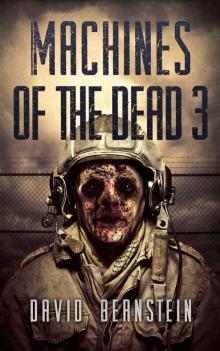 Machines of the Dead (Book 3)
Machines of the Dead (Book 3) Tears of No Return
Tears of No Return Relic of Death
Relic of Death Machines of the Dead aza-1
Machines of the Dead aza-1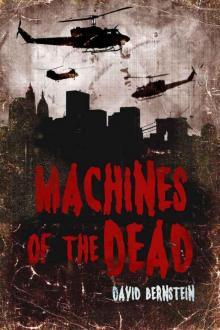 Machines of the Dead
Machines of the Dead Surrogate
Surrogate Apartment 7C
Apartment 7C Blue Demon
Blue Demon Amongst the Dead
Amongst the Dead Goblins
Goblins Witch Island
Witch Island Another Man's Wife plus 3 Other Tales of Horror
Another Man's Wife plus 3 Other Tales of Horror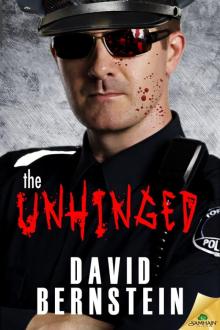 The Unhinged
The Unhinged Episodes of Violence
Episodes of Violence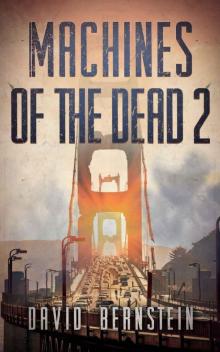 Machines of the Dead (Book 2)
Machines of the Dead (Book 2) Jackpot
Jackpot The Sludge
The Sludge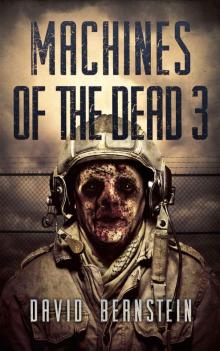 Machines of the Dead 3
Machines of the Dead 3